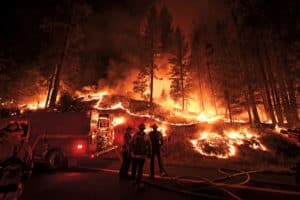
Firefighters try to control a blaze as it spreads toward the towns of Douglas City and Lewiston in California on July 31, 2018.
Credit: Mark Ralston/AFP/Getty
Over the last couple of decades, as the impact of global warming has intensified, the discussion of climate change has spilled out of the scientific and technocratic circles within which it was long confined. Today, the subject has also become an important concern in the humanities and arts.
Discussions of climate tend to focus on the future. Yet even scientific projections depend crucially on the study of the past: Proxy data, such as tree rings, pollen deposits, and ice cores, have proved indispensable for the modeling of the future impact of climate change. Based on evidence of this kind, scientists can tell us a great deal about how trees, glaciers, and sea levels will respond to rising temperatures.
But what about the political and social impact of global warming? What effects might a major shift in climate have on governments, public institutions, warfare, and belief systems? For answers […]











The latest IPCC report estimates we have a 5% chance of staying below 2 degrees C warming and a 10% chance of going of 4 degrees C or more warming.
Imagine getting on an airplane and having the pilot inform you there is a one in twenty chance that you will crash on landing, many will die and all will be injured or traumatized for life…and a one in ten chance everyone (and I mean everyone) will die.
What would you do?
Please keep in mind the problem is not just the singlr flight you are getting on, the problem is deeply systemic…And the time window to take effective action is closing
Sort of a misnomer to refer to “the Coming Climate Crisis”. It’s already here, as we move through the blade and crook of Michael Mann’s hockey stick, to getting the shaft.